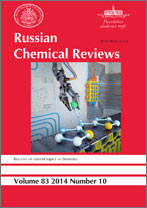|
This article is cited in 7 scientific papers (total in 7 papers)
Selective oxidation of gaseous hydrocarbons by bacterial cells
G. A. Kovalenko
Boreskov Institute of Catalysis SB RAS, Novosibirsk
Abstract:
Studies on the direct selective oxidation of gaseous C1–C4 alkanes and C2–C4 alkenes to valuable oxygen-containing products (alcohols, methyl ketones, and epoxides) with the aid of the bacterial cells of gas-assimilating microorganisms are surveyed. The resting bacterial cells of the microorganisms grown on gaseous hydrocarbons possess an enzymic monoxygenase activity: they promote the insertion of an oxygen atom into the hydrocarbon molecule with formation of an oxygen-containing product. This process is effected under very mild conditions and is characterised by high selectivity and stereospecificity. It proceeds without the formation of toxic by-products. Certain problems of the practical implementation of biocatalytic oxidation processes, namely the regeneration of the monoxygenase cofactor, the reduction of the toxic effect of the oxygen-containing product formed, as well as the immobilisation of the cells on solid carriers in order to obtain an active and stable heterogeneous biocatalyst for the direct partial oxidation of hydrocarbons are considered. The bibliography includes 111 references.
Received: 15.02.1996
Citation:
G. A. Kovalenko, “Selective oxidation of gaseous hydrocarbons by bacterial cells”, Usp. Khim., 65:7 (1996), 676–691; Russian Chem. Reviews, 65:7 (1996), 625–639
Linking options:
https://www.mathnet.ru/eng/rcr1306https://doi.org/10.1070/RC1996v065n07ABEH000230 https://www.mathnet.ru/eng/rcr/v65/i7/p676
|


| Statistics & downloads: |
| Abstract page: | 91 |
|





 Contact us:
Contact us: Terms of Use
Terms of Use
 Registration to the website
Registration to the website Logotypes
Logotypes








